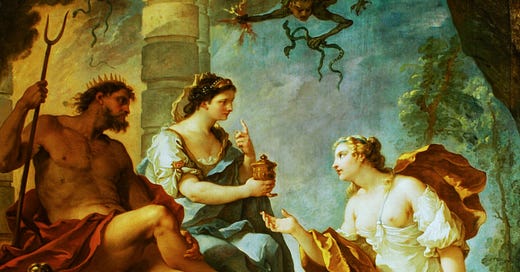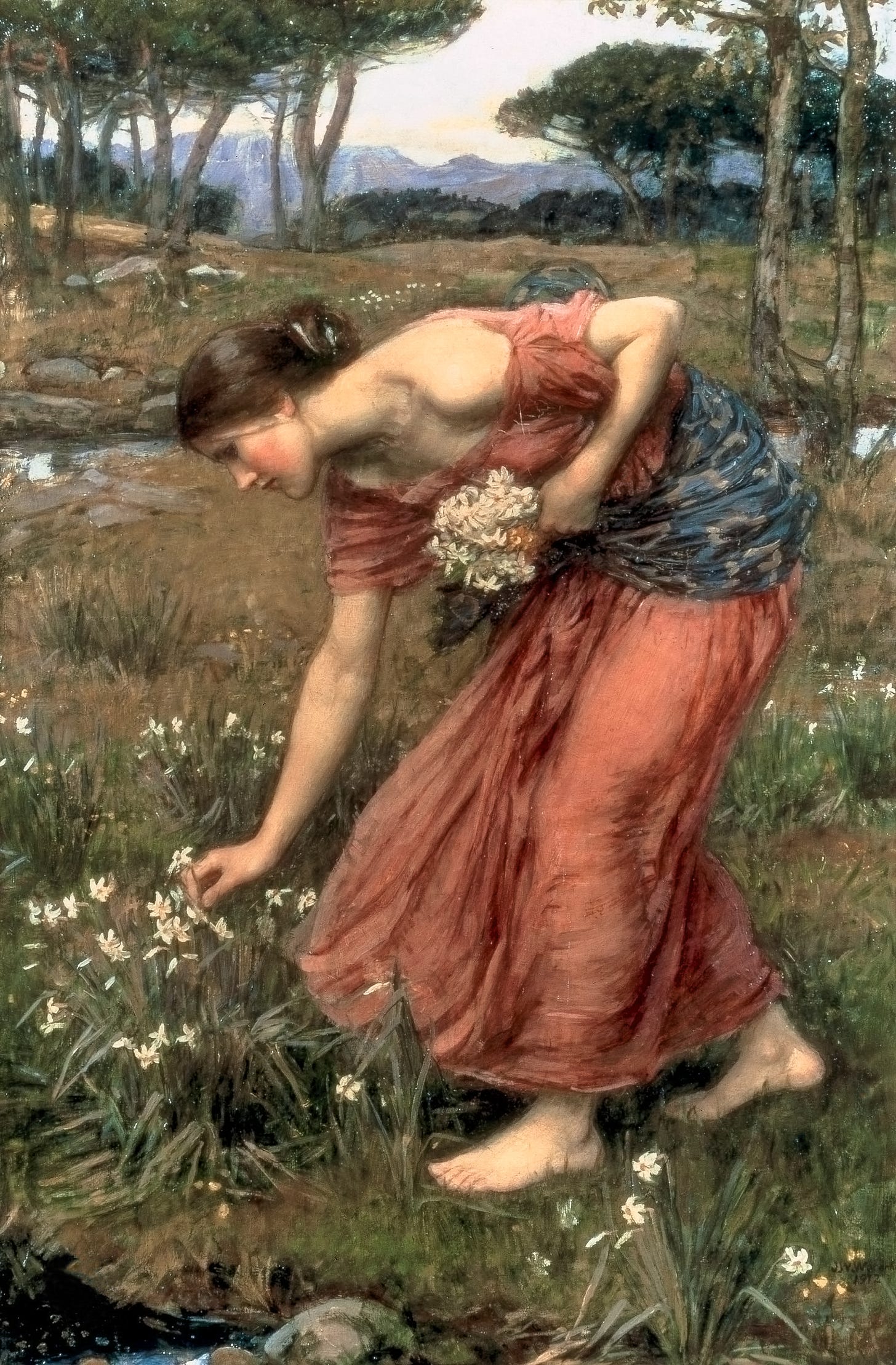“We are dragged into Hades' chariot only if we are out in Demeter's green fields, seductively innocent with playmates among flowers. That world has to open up. When the bottom falls out, we feel only the black abyss of despair…”
- James Hillman, The Dream and the Underworld
The experience of the unconscious is often intense and overwhelming. It shakes the very structures of our habitual modes of consciousness. It threatens our ego’s thin veil of control on our inner and outer world. Mythology (which provides us with images and narratives of archetypal experiences) demonstrates this clearly:
Like Parsifal, we may be stunned into silence and awe when the holy grail is paraded before us. We awake from the experience, uncertain if it was real or a dream.
Like Semele, we may experience total annihilation by daring to look upon the splendor and power of a pure godly archetype.
Like Vasilisa, we may quiver with fear as we meet the Baba Yaga, who threatens death while dangling the promise of new life, should we meet her demands.
The nature of the unconscious and archetypes is multivalent. When we touch upon this energy, it can inspire and enliven us. It can set us upon an extraverted Hero’s Journey where we answer the call to adventure and boldly enter into new territory. Other times, the meeting with the unconscious is felt as a complete and total standstill. Inertia sets in. A heavy darkness pervades life. Like Persephone, we are abducted from a safe haven and drawn into the depths to encounter the underworld.
This stands in contrast to the excitement of the Hero’s quest. Persephone’s story demonstrates how this experience of the unconscious feels like a violation. We are gripped by the cold hands of death and dragged to a realm where no one returns. Life lacks energy, warmth, and nurturance. As Hillman puts it, “The Persephone experience occurs to us each in sudden depressions, when we feel ourselves caught in hatefulness, cold, numbed, and drawn downward out of life by a force we cannot see…”
But that is not where Persephone’s story ends. Eventually she returns, Queen of the Underworld, living between realms. She brings forth the promise of spring, an end to the hold winter has upon the land. With her descent, the world once again experiences its natural withering. This shows us that a painful initiation taps us into the creative cycles of life. That there is a greater telos that underlies these experiences. We have the potential to transform, to individuate, if we can metabolize the material of the unconscious. If we can orient ourselves while in the dark forest of psyche.
The Ebb and Flow of Psychic Energy
“We would be better advised, therefore, when speaking of libido, to understand it as an energy-value which is able to communicate itself to any field of activity whatsoever, be it power, hunger, hatred, sexuality, or religion, without ever being itself a specific instinct.”
- C.G. Jung, The Concept of Libido (CW 5)
Tracking Persephone, within this context, is tracking the loss (and eventual return) of psychological energy (libido). This essence is constantly flowing through our psyche. It is the energetic lifeblood that animates our instincts, emotions, desires, and activities. When libido is progressing, it moves clearly through us. We are able to harness and allocate it to different areas of life. It naturally fuels the psychic system, providing a sense of aliveness to everyday tasks. (Think Persephone joyfully wandering through the fields, picking flowers and playing with the nymphs).
The great ebb and flow of life eventually demands a change. The energy, once moving freely forward, halts and shifts direction. Whether from illness, trauma, unforeseen events, or the mysterious hand of fate, there is a dramatic turn felt all throughout psyche and soma. The motivating force drains from life. Heavy depression, uncertainty, listlessness, and inner conflict settles over us. (Persephone has been abducted from the sunny gardens and now wanders through Hades).
Jung reminds us of an important point as it concerns psychic energy. When our ego loses access to the powerful progressive libido, it does not simply vanish. Rather, it marks a regression to the unconscious.
“Regression . . . as an adaptation to the conditions of the inner world, springs from the vital need to satisfy the demands of individuation.”
- C.G. Jung, "On Psychic Energy" (CW 8)
The inner world calls us. Sometimes we choose to enter these states freely. We come upon an entrance to Hades, and so tasked to discover its hidden treasures, we descend. Other times, like Persephone, we are caught off guard. Overwhelmed, stolen, wishing we could return to our old way of life.
Either way, we must discover the greater purpose at hand. Why has the unconscious come calling at this time? In what ways are we being challenged to develop a new way of life? What shadow has gone too long unnoticed?
Renewal via the Introverted Descent
“Whenever some great work is to be accomplished, before which a man recoils, doubtful of his strength, his libido streams back to the fountainhead—and that is the dangerous moment when the issue hangs between annihilation and new life. For if the libido gets stuck in the wonderland of this inner world, then for the upper world man is nothing but a shadow, he is already moribund or at least seriously ill. But if the libido manages to tear itself loose and force its way up again, something like a miracle happens: the journey to the underworld was a plunge into the fountain of youth, and the libido, apparently dead, wakes to renewed fruitfulness.”
- C.G. Jung “The Battle for Deliverance from the Mother” (CW 5)
Here we see that attending to these so-called individuation demands is a radical turning towards the inner world, to our deepest sense of self, our inner landscape. This is an introverted regression of libido where the energy is becoming self-contained, protected from the outside where it siphons off resources.
It begs the questions:
In what ways have I become too identified with my job, a relationship, the responsibilities others have placed upon me?
In what ways might I be prioritizing the needs of others over myself?
Am I too distracted, not noticing the subtle (or not so subtle) signals from within?
Have I lost the ability to seamlessly move between the inner and outer world? Did I never develop these skills in the first place?
Following the archetypal map of the mythology, we notice little hints of this in Persephone’s story. As a maiden, she seems completely identified as a “mother’s daughter”. She has yet to break away from Demeter’s protective cocoon. Does she spend each day doing as her mother bids? Never straying too far out of sight, staying close at hand? Persephone, the puella, is stuck in adolescence. She hovers on the threshold of change. Something must tip the scales to move her forward.
When we stand on this threshold, whether we are conscious of it or not, we are likely to be doubtful or resistant. Unable to see the greater scope of our individuation path, we may choose to stay complacent. As Jung mentions in the quote above, there is an opus being worked upon. A process of evolution that requires the dissolution and rebuilding of our inner and outer world. If we knew everything it might demand of us, we would quickly say, “No thank you, I’ve got enough on my plate. I don’t need to face these things within myself.”
So the unconscious chooses for us. The underworld opens up and steals us away. The excitement of outer life diminishes. The introversion, the inward focusing of energy, sends resources into the depths. The confrontation is forced. It stirs up the shadow and our warring complexes.
It is typical of this time to feel lost, like we are wandering without direction. But if we are able to withstand this period, things begin to change. As unconscious contents are met, we begin to build new adaptations. To resolve the tension that had been festering within. To foster development where we may have been stuck.
While in Hades, Persephone eats pomegranate seeds. Psychologically, I see this as representing the integration of the unconscious. The accepting and binding of shadow material. This forever ties her to Hades' side. She becomes a part of the underworld, and it a part of her.
When she emerges, she is renewed. Old layers have been shed, new power and authority gained. She is no longer a simple maiden or a mother’s daughter. She is embodied within herself. Wise to the secrets and ways of life. Initiated.
Persephone’s descent reminds us to contemplate our painful initiations. To consider what new areas of our psyche are striving to come into full bloom. It challenges us to profound introversion, the releasing of outer ties, and the withdrawal to self. Her story holds us in an archetypal constellation that echoes with the cycles of nature; life and death in service to the great forces of rebirth that underlie us all.
Join the conversation
All comments are welcome, but here are a few questions to consider:
What is your relationship to the myth of Persephone?
Have you experienced a significant shift that lead to a period of introverted descent?
What practices or insights help you navigate periods of inner turmoil or initiation?
Archetypal Encounters: Persephone
Inspired by this article, I offered a live class that explored the mythological, symbolic, and psychological threads surrounding Persephone’s journey. A replay of the class is available for purchase:










thank you for this wonderful piece, I loved it all but especially was struck by the idea of Persephone eating the pomegranate seeds as the integration of unconscious material, that is so beautiful.
What a rich, illuminating article! Perfectly timed for the descent that winter always is — I'm grateful for the reminder that this oppressive darkness (politically, too) can be extremely fertile and incubating. As an author and screenwriter, archetypes constantly inform my work and Persephone is a key goddess archetype for me (along with Artemis). She runs through my crime novels in both the female victims of male oppression and the outsiderness of the female police, detectives and agents who make a deliberate descent into darkness to catch abusers and killers.
For the first time, I'm writing a novel with a Demeter main character, but there are, as the archetype demands, lots of Persephones she's determined to rescue.
Thanks again for so much to think about and the gorgeous Pre-Raphaelite illustrations!